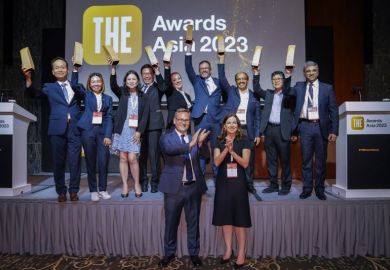Mexican universities have been urged to get more involved in training skilled workers as its economy benefits from a “nearshoring” boom that has brought billions of dollars of investment.
Several regions of the country have benefitted from the practice of primarily US-based companies outsourcing services and production to nearby countries instead of further afield in order to integrate supply chains, Times Higher Education’s Latin America Summit at the Monterrey Institute of Technology heard.
Ivan Rodriguez, the economic secretary for the Ministry of the Economy for the Government of Nuevo Leon – the region where Tec is located – said that it was experiencing an “economic era we have not seen before”.
He said 50 per cent of the “nearshoring” that has come to Mexico has been invested in Nuevo Leon, with 140 companies expanding or making new investments in the past year-and-a-half, with electric car manufacturers Tesla and Kia the latest to set up a presence in the area.
The boom was being fuelled by Nuevo Leon’s human capital, Mr Rodriguez said, pointing out that its universities graduate 50,000 scientists and engineers a year, but there were 100,000 people looking for new jobs.
He said the government had been involved in facilitating talks to ensure universities provide the skills that the new workforce needs.
But Arturo Cherbowski, general director of Universia, a network of 1,401 universities in 20 countries across the world, said the area’s success was an anomaly that was yet to be replicated across Mexico and the wider continent.
“It is starting to happen in Nuevo Leon, but universities need to do way more than they are doing now,” he told the summit.
While regulation was an issue, he said universities could be more flexible in changing their curricula and offering microcredentials and competency-based education; an area where most are “severely lacking”.
“No university can handle the upcoming demand alone,” he said. “So, we have to stop seeing each other as competitors and start collaborating.”
Mr Cherbowski – also executive director of Santander Universities – said that while much had been said about institutions in Mexico accessing funding from industry, little investment had materialised in practice.
Given the “dropping in prestige” of universities worldwide, he said there was an increased need to show how higher education can fulfil society’s needs.
“What does the world need from universities? It is not what it needed 50 years ago…most of the world now needs new kinds of universities,” he said.
Speaking to Times Higher Education at the event, Hector Ceballos, the director of the Living Lab and Data Hub of Tec’s Institute for the Future of Education, agreed the economic boom will mean Mexican universities will have to change and not only deliver full degrees but technical qualifications as well.
The lab has already started working with the automotive industry to assess its needs and will be reaching out to other industries, he said.
“We have a lot of foreign companies looking for people that are not only expert engineers but also technicians who have the right accreditation,” he said.
“If we can prepare people at all the levels then we can make an impact. Otherwise, that company will bring people from other countries and the opportunity will be lost. We are not looking for Nobels but people who can work.”




